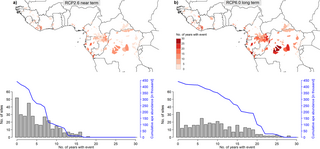"Climate change could cause 'generational trauma' in great apes"
cbc.ca/news/climate/apes-clima…
<💬>
"They're facing a lot of threats that are much more imminent than climate change," said Stefanie Heinicke, a postdoctoral researcher at the Potsdam Institute for Climate Impact Research in Germany.
</💬>
<💬>
"What you see, as a result of humans then trying to survive in these desperate circumstances, is that they turn to the forest for resources," Kalan said, describing it as a source of food and fuel such as charcoal.
</💬>
...
Paper here: journals.plos.org/climate/arti…
<💬>
For the first time, we showed that African ape sites have already experienced changes in climatic conditions and are likely to be exposed to extreme events in the future. We found that temperatures have increased over the past decades at the majority of ape sites, and in line with a previous study [14], we found a consistent increase in future temperatures. Bonobo sites covered the narrowest temperature range, which indicates a potentially lower physiological tolerance that might make bonobos more sensitive to climate change impacts [65]. We also showed that the majority of ape sites will be exposed to a high frequency of heatwaves. It has been shown that chimpanzees occurring in an area with high temperatures experience heat stress [18]. The impact of heatwaves on primates has not yet been studied, but high mortality of humans during heatwaves [35] and mass die-offs for some taxa (e.g., flying foxes [36]) have been observed. Thus, given the projected prevalence of heatwaves across ape sites, there is a need to understand sensitivity of apes to this extreme event. Thermoregulation behaviours have already been observed in apes (e.g., higher drinking frequency, nocturnal behaviour, sitting in caves and pools [18–20]). Though the behavioural flexibility of apes allows them to adapt to higher temperatures to some degree, these behaviours have only been observed for a few study sites, and it is not known how effective these adaptation strategies are, given, for example, that apes compete for access to standing water sources with humans and their livestock in dry habitats. In addition, these adaptive behaviours entail trade-offs, such as less time for feeding, or increased predation pressure at night. When more energy is used for thermoregulation this can reduce other physiological processes such as reduced functionality of the immune system, as observed for birds [22]. Behavioural and physiological trade-offs can result in a decline of body condition, as well as lower survival and fertility (Table 2).
</💬>

Exposure of African ape sites to climate change impacts
Large gaps remain in our understanding of the vulnerability of specific animal taxa and regions to climate change, especially regarding extreme climate impact events.journals.plos.org
Lo, thar be cookies on this site to keep track of your login. By clicking 'okay', you are CONSENTING to this.